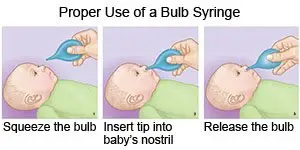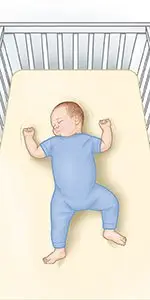What is apnea of prematurity?
Apnea of prematurity is an episode when a premature baby stops breathing for 15 to 20 seconds. Premature babies are born earlier than 37 weeks, before certain parts of the body have fully formed. Apnea may happen when the part of the brain that controls breathing is affected. It may also happen from weak airway and breathing muscles. Most premature babies outgrow apnea after a few weeks.
What other signs may my baby have during an apnea episode?
- Decreased or slowed heartbeat
- Limp muscles
- Pale or blue skin or nails
How is apnea of prematurity diagnosed and treated?
Your baby's breathing and heart rate will be monitored while he or she sleeps. He or she may need any of the following:
- Gentle stimulation, such as rubbing your baby's skin, may be used for mild apnea.
- Medicine may be used if apnea happens often, or if your baby's skin turns pale or bluish. This medicine stimulates the part of his or her brain that controls breathing.
- Breathing support may be needed. Support may include extra oxygen, continuous positive airway pressure (CPAP), or a ventilator.
What should I do if my baby is not breathing?
Do not shake your baby to make him or her breathe.
- Gently tap the sole of your baby's foot.
- Rub his or her back.
- Change the position of his or her head and neck.
- Perform cardiopulmonary resuscitation (CPR), if necessary. Then call your local emergency number. Keep emergency numbers near the phone.
What can I do to help my baby breathe easier?
- Remove mucus from your baby's nose with a bulb syringe. Squeeze the bulb and gently put the tip into one of your baby's nostrils. Do not put the stem of the syringe in your baby's nose. Release the bulb so that it sucks out the mucus. When the bulb has expanded, remove it from your baby's nose. Empty it into a tissue. Repeat the steps for the other nostril, if needed.

- Have your baby lie with his or her head and body in a straight line. Make sure your baby's head does not flop forward or bend to the side.
- Always put your baby on his or her back to sleep. Do this every time your baby sleeps (naps and at night). Do this even if he or she sleeps more soundly on his or her stomach or side.

- Take extra care when you feed your baby. Hold your baby so his or her head is higher than his or her stomach. Feed your baby in a place with enough light so you can see any changes in his or her skin color. Stop from time to time to allow your baby to take breaths between sucks on the bottle or breast. Stop the feeding if he or she looks tired.
- Use a cool mist humidifier to increase air moisture in your home. This may make it easier for your child to breathe and help decrease his or her cough.
- Do not let anyone smoke around your baby. Cigarette smoke can affect your baby's lungs and make it more difficult for him or her to breathe.
Treatment options
The following list of medications are in some way related to or used in the treatment of this condition.
- theophylline
- Cafcit
- Elixophyllin
- Theo-24
- caffeine
Where can I find support and more information?
- American Academy of Pediatrics
345 Park Boulevard
Itasca , IL 60143
Phone: 1- 800 - 433-9016
Web Address: http://www.aap.org
Call your local emergency number (911 in the US) if:
- You have to perform CPR on your baby.
- Your baby stops breathing and you cannot get him or her to breathe.
- Your baby is struggling to breathe, or gasping for breath.
- Your baby will not wake up.
When should I call my baby's pediatrician?
- Your baby's skin, lips, or fingernails are pale or blue.
- You have questions about your baby's condition or care.
Care Agreement
You have the right to help plan your baby's care. Learn about your baby's health condition and how it may be treated. Discuss treatment options with your baby's healthcare providers to decide what care you want for your baby. The above information is an educational aid only. It is not intended as medical advice for individual conditions or treatments. Talk to your doctor, nurse or pharmacist before following any medical regimen to see if it is safe and effective for you.© Copyright Merative 2023 Information is for End User's use only and may not be sold, redistributed or otherwise used for commercial purposes.




